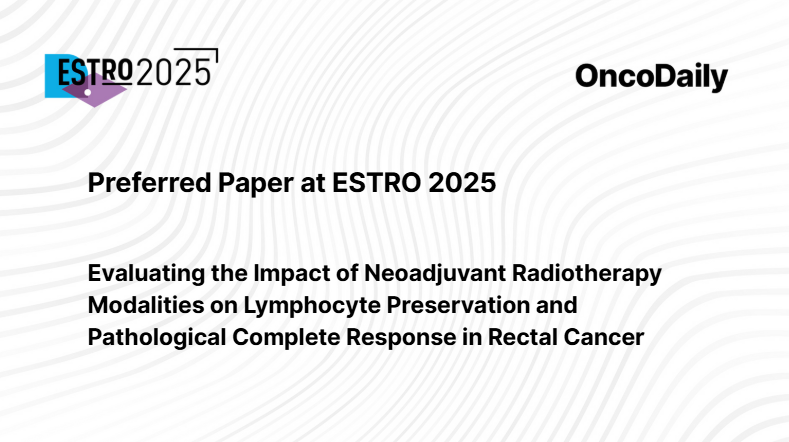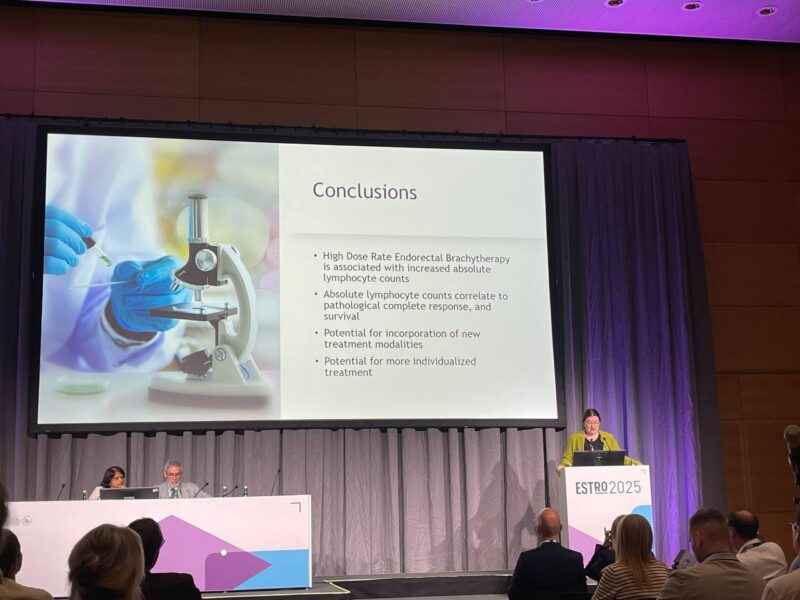
Preferred Papers from ESTRO 2025: Neoadjuvant Radiotherapy, Lymphocyte Preservation an pCR in Rectal Cancer
A retrospective study from the Jewish General Hospital in Montreal presented at ESTRO 2025 evaluated the effect of neoadjuvant radiotherapy modality on absolute lymphocyte count (ALC) and its association with pathological complete response (pCR) in rectal cancer patients. Compared to external beam radiation therapy (EBRT), high-dose rate brachytherapy (HDRBT) was associated with significantly higher post-treatment ALC and improved oncological outcomes.
Study designs and methods
A retrospective chart review was conducted at our institution, including 197 rectal cancer patients treated between 2008–2009. Patients received either:
- External beam radiotherapy (EBRT): 45–56 Gy in 25–30 fractions, or
- High-dose-rate (HDR) brachytherapy: A targeted modality preserving adjacent lymphoid tissue.
Standard-of-care blood tests were used to measure absolute lymphocyte counts at three timepoints:
- Baseline (pre-treatment),
- Post-radiation (prior to surgery)
- Post Surgery (Pathological response was assessed after surgical resection)

Results
Preservation of circulating lymphocytes – more feasible with targeted modalities like brachytherapy—may be critical for achieving pCR in rectal cancer. These findings support further exploration of immune-preserving radiotherapy strategies, and even integrating immunotherapy in selected patients. Moreover, standard lymphocyte counts could serve as a simple biomarker to guide individualized treatment plans, potentially helping identify candidates for non-operative management or intensified therapy.
- The overall pCR rate was 20%.
- Patients with higher post-radiation lymphocyte counts had a significantly higher pCR rate (28%) compared to those with lower counts (13%).
- Baseline lymphocyte counts did not significantly differ between pCR and non-pCR groups, suggesting that lymphocyte preservation during radiotherapy, rather than pre-treatment immune status, was key.
- Among the modalities, brachytherapy was associated with better preservation of circulating lymphocytes and improved response rates.
A 5-year survival analysis showed
- Overall survival: 83.5%
- Local recurrence-free survival: 71.9%
- Distant metastasis-free survival: 48.5%
Key Takeaways
- High Dose Rate Endorectal Brachytherapy is associated with increased absolute lymphocyte counts
- Absolute lymphocyte counts correlate to pathological complete response, and survival
- Potential for incorporation of new treatment modalities
- Potential for more individualized treatment
Read ESTRO 2025 Updates on OncoDaily.

-
Challenging the Status Quo in Colorectal Cancer 2024
December 6-8, 2024
-
ESMO 2024 Congress
September 13-17, 2024
-
ASCO Annual Meeting
May 30 - June 4, 2024
-
Yvonne Award 2024
May 31, 2024
-
OncoThon 2024, Online
Feb. 15, 2024
-
Global Summit on War & Cancer 2023, Online
Dec. 14-16, 2023
